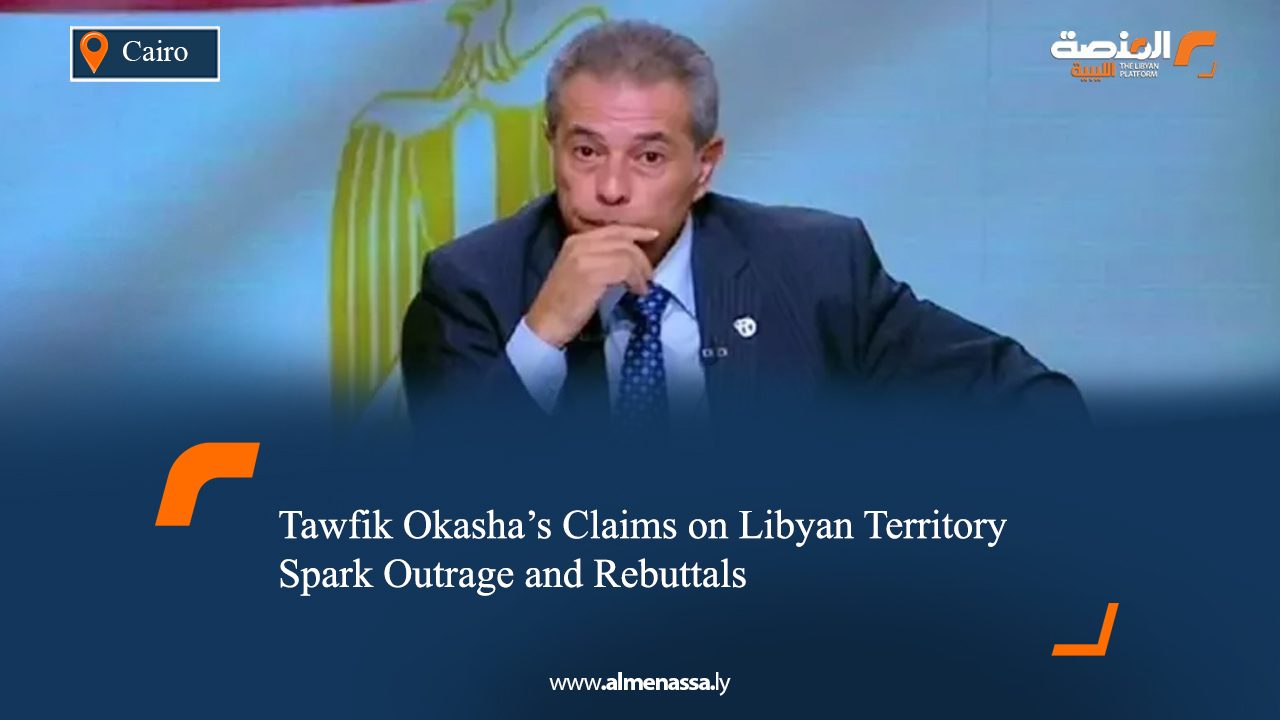Egyptian media personality Tawfik Okasha has stirred controversy by claiming Egypt’s historical right to parts of eastern Libya, prompting a wave of angry reactions across the Libyan public sphere.
Reclaiming Egypt’s Borders
In televised remarks, Okasha called for restoring Egypt’s borders to their pre-1954 configuration through a federal system encompassing Sudan, eastern Libya, and Gaza, a move he claimed would resolve the Gaza issue entirely.
He asserted that these regions had been Egyptian for 9,000 years, arguing that their separation from Egypt had led to stagnation and instability. Okasha claimed that reintegration under a federal model tailored to each region’s social fabric would end coups and conflicts.
He also described Sudan as an inseparable part of Egypt, historically known as “Upper Egypt,” and questioned whether any non-Egyptian rulers had governed these areas in the past two millennia.
Disregard for Sovereignty
Okasha’s remarks triggered widespread condemnation. Libyan journalist Ahmed Bougrassa responded by saying that seniority in the media profession does not grant Okasha a license to overstep boundaries or shirk responsibility.
Bougrassa rejected the idea of annexing eastern Libya, Sudan, or Gaza, calling it a dangerous affront to national sovereignty. He emphasized that Libya is not a blank canvas for political fantasy, and historical missteps do not justify tampering with borders.
He urged Okasha to respect Libya’s sovereignty.
Collapse and Opportunism
International referee Ahlam Farhat argued that Okasha’s proposal, while framed as a national security measure, lacks political grounding. She suggested he was exploiting Libya’s state collapse to justify reclaiming what he called “historically Egyptian land.”
Farhat noted that Egypt has never officially proposed annexing Libyan territory, and that the internationally recognized border between the two countries was finalized in 1954 and remains intact.
She added that Okasha’s claims have found no traction within Egyptian institutions and have drawn internal criticism for risking regional tensions. Egypt, she said, respects its neighbors’ sovereignty and openly supports Libya’s unity and stability.
Farhat concluded that emotional rhetoric does not build nations, and sovereignty is upheld through law and reality, not slogans.
Political Comeback?
Media professor Karim Al-Zayyani dismissed Okasha’s claims, noting that both Egypt and Libya were under foreign occupation during the periods he referenced. He suggested Okasha’s statements were a bid to re-enter the public spotlight after being expelled from parliament for meeting with the Israeli ambassador.
Beyond the Headlines
Libyan journalist Nabil Al-Hajj emphasized that Libyan-Egyptian relations are deeper than any isolated statement. He called for regional cooperation over expansionist ambitions or nostalgic border maps.
Al-Hajj urged Egyptian media figures like Okasha to recognize the sensitivity of the moment and respect national sovereignty, warning that such proposals could isolate Egypt diplomatically and jeopardize its ties with neighboring states.
Controversial Past
Journalist Khaled Mahmoud recounted Okasha’s controversial history, including a forged doctoral degree and his role as chairman of the now-defunct Al-Faraeen TV channel. He was expelled from parliament in 2016 after hosting the Israeli ambassador at his home, an act considered normalization with Israel.
Mahmoud noted Okasha’s repeated legal troubles and penchant for provocative political and economic commentary.
Historical Maps and Cultural Identity
Activist Mohamed Salem Al-Zawawi responded by posting a historical map of Greater Tripoli during the Ottoman and Karamanli eras, showing territory extending beyond Egypt’s current borders to the Siwa region.
He cited Herodotus’s writings on the land of the Libu, stretching from the Temple of Amun (Siwa) to Lake Tritonis (Gabès), and argued that colonial powers had redrawn borders to Egypt’s detriment.
Al-Zawawi maintained that these regions still retain Libyan cultural identity in their dialects, dress, and cuisine.
Public Backlash
While no official Libyan response has been issued, Okasha’s remarks have ignited widespread debate on social media, ranging from ridicule to historical rebuttals.


